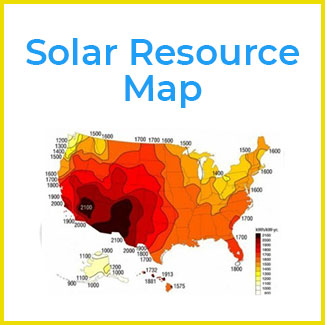Well that depends. Assuming you passed the first two important criteria of ownership of your building and decent roof (or alternative) space for panels, the last key criteria to satisfy is your location. Your location (i.e. where you live) is an important factor when going solar, because your location determines the following three factors, which in turn will determine if going solar will make economic sense for you.
1) Solar Resource: This is how much sun you get. As you can see from the below map, some places have a lot more solar resource than others. An average location in the US gets 1600 hours of sun per year. Seattle, WA gets only 1300 where as Boulder, CO gets 1900 hours per year. Obviously the more solar resource the more it makes sense to go solar.
2) Your Utility Company and its Electricity Rates: Electricity rates range from 6 cents per kWh to 45 cents per kWh across the US. In most cases, if you are paying more than ~13 cents per kWh, then making an investment in a solar system will make financial sense for you.
3) Your consumption and effective rate: One important aspect of your bill is how your consumption is charged. For example in California, the average electricity rate is about 15 cents per kWh. But in most utility company districts, there is the practice of tiered pricing. That means your consumption is charged at increasing rates as your consumption rises. So people with larger homes pay 12 cents per kWh for their base level usage but quickly jump to paying rates of 25 to 40 cents per kWh for any consumption over the base usage. In such cases, it makes sense to offset your high rate usage but not necessarily your base level usage.
Learn how to calculate the return on investment of a solar system >>
[How to calculate exactly how big a solar system to build].

